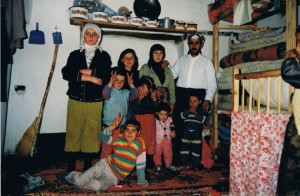War Crimes Against Kurds in Turkey Still Go Unpunished
 On 3 October 1993, Turkish soldiers set fire to the house of Nasır Öğüt and his family in the Kurdish town of Vartinis in Muş, burning him, his wife and seven children to death.
On 3 October 1993, Turkish soldiers set fire to the house of Nasır Öğüt and his family in the Kurdish town of Vartinis in Muş, burning him, his wife and seven children to death.
Aysel Öğüt, the only surviving member of the family, attempted to litigate, stating that all of her family members were burned alive by soldiers. The chief public prosecutor’s office of Muş issued a decision of non-jurisdiction on the case through an indictment in 1993, alleging that the incident was committed by the PKK. The state security court of Diyarbakir dismissed the case based upon this ruling.
But Aysel Öğüt applied to the chief public prosecutor’s office of Muş in 2003, demanding that the case be opened again. The application of investigation made by the chief public prosecutor to the office of the governor was accepted on 22 May 2006 “as the investigation would benefit the public weal.”
But the chief public prosecutor’s office of the province of Muş asked the military prosecutor’s office of Elazığ to launch an investigation against the persons involved in the massacre on the grounds that they were serving in the army at the time.
As the military prosecutors have not finished the investigation for seven years since the application was filed, Aysel Öğüt has not been able to open a lawsuit against the state officials responsible for the death of her family members.
9 people from her family were burned to death before her eyes but the case is still at the stage of investigation after 17 years, Aysel Öğüt said. She will go after those responsible for the massacre and take the case to the European Court of Human Rights, she added.
In 1993, a conflict took place here. A soldier and a guerilla lost their lives. Captain Bülent Karaoğlan said ‘I will burn down and destroy all of those houses.’
The soldiers came here at night and besieged the town. There were thousands of them. They surrounded all houses with armed vehicles. I was in my neighbor’s house that night. We did not have the courage to go outside.
A tank opened fire at my father’s house, which turned it into a fireball. The voices of my little brothers and sisters could be heard. They were screaming. My 2-year-old brother tried to jump out of the window but the soldiers hit him with their rifles and stopped him. I lost all of my family. They were brutally massacred before my eyes.
The residents of the town and eye witnesses also state that the massacre was committed by the Turkish army. One of the eye witnesses is Remzi Öğüt, who lives in the same neighborhood.
He went outside while Nasır Öğüt’s house was burned and was beaten by the soldiers, Remzi Öğüt said.
The soldiers stormed the town at night, randomly setting all corners up on fire. No one could take a step outside their homes in fear. There were also two children in the house where nine people were burned to death. The children tried to jump out of the windows but they were not allowed to.
A website has been launched in loving memory of the Nasır Öğüt family where you can also see the photos of the late family members.
Families of victims search for justice for thousands of state-perpetrated killings and disappearances in the 1990s
The responsibility of the Turkish state forces or officials for the evacuation of villages and killings of Kurdish civilians has been confirmed by national and international organizations.
Around 4-4.5 million Kurdish people were displaced and left homeless in the 1990s, with 3,438 Kurdish villages evacuated by Turkish soldiers, according to the Migrants’ Association for Social Cooperation and Culture in Turkey. Evacuations were carried out with extreme brutality, with reports of severe human rights violations, such as rape, property destruction, beatings and extrajudicial executions, the Internal Displacement Monitoring Centre (IDMC) reported.
Comments
I can’t stop myself from reading these disturbing stories. The Turkish state should be ashamed of their government. That is why I laugh evertime they lose one of their own!!!